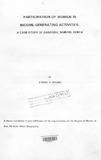| dc.description.abstract | The study aims at finding out factors which determine women's participation in
income-generating activities, the amount of income women gain in a month and
problems which face women participating in income-generating activities. From these
objectives, four hypotheses have been proposed, namely; there is no significant
relationship between types of income-generating activities and age; and there is no
significant relationship between income generating activities and marital status and
level of education, mean aqe of children and family size , do not determine the amount
of income gain in a month are tested. Two statistical analyses methods have been
used to test the hypotheses of the study namely the Chi-square test and Multiple
Linear Regression analysis. From the results of the Chi-square tests, it was
established that whereas years of formal schooling and age determined participation
in specific income generating activities to a large extent, marital status did not
determine participation in income-generating activities significantly. These
conclusions are arrived at because the Chi-square values in the first two tests are
large and deviate significantly from the tabulated or hypothetical values. In the third
instance, apart from being less than the hypothetical value the difference is
insignificant.
From the result of Multiple Linear Regression Analysis it is concluded that the
amount of income gained in a month by women was affected by years of formal
schooling, mean age of children and family size. This conclusion is arrived at because
the calculated F-value is far much greater than the critical one. It is important to
stress, however, that whereas the first two variables had a positive impact on income
gained the last one had a negative impact. This is because the partial correlation
coefficient of this variable is negative.
It is important to note non statistical techniques of analysis are also used in this Thesis. These are descriptions, percentages , maps, and diagrams among
others. It is from these analyses that the conclusions arrived at in this thesis have
been derived. The problems facing women participating in income-generating
activities are numerous. However, the one which was cited by most participants was
frequent demolitions by the Nairobi City Commission (NCC) security personnel.
From the above conclusions, therefore, it was recommended that since
education was a variable which determined participation in income-generating
activities, amount of income gained in a month and was the root cause of most of the
problems experienced by women participating in income-generating activities, the
Government of Kenya (GOK) should make the field of women's education a priority.
Programmes for educating women in order to acquire knowledge and skills which are
necessary for effective participation in income-generating activities should be
expanded. Further, women should be encouraged to use family planning facilities in
hospitals. More day care facilities for children should also be constructed within urban
areas. Not to mention that women should use appropriate technology devices which
eases housework and leave them with plenty of time to put in their income-generating
activities. Further, the study recommends to future researchers in the field of income
generating activities that they only concentrate on one type of activity for detailed
analyses other than making general consideration o all of them | en |

